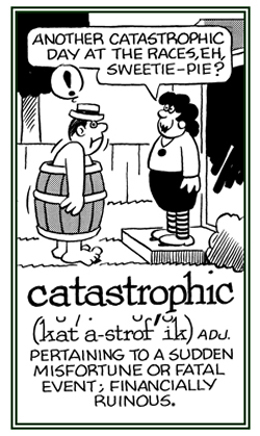cata-, cat-, cath-, kata-
(Greek: down, downward; under, lower; against; entirely, in accordance with, completely; definitely)
catarrhine
1. Having a narrow or slender nose.
2. Apes or monkeys that have the nostrils close together, oblique, and directed downwards, and opposite thumbs on all the limbs which includes all the apes of the old world.
2. Apes or monkeys that have the nostrils close together, oblique, and directed downwards, and opposite thumbs on all the limbs which includes all the apes of the old world.
The intensified part in a classical tragedy that is directly preceding the catastrophe or sudden calamity and disaster: A catastasis is the climax of a drama or other similar presentations.

© ALL rights are reserved.
Go to this Word A Day Revisited Index

Go to this Word A Day Revisited Index
so you can see more of Mickey Bach's cartoons.
catastrophe
1. A terrible disaster or accident; especially, one that leads to a great loss of life.
2. A total or absolute failure, often in humiliating or embarrassing circumstances.
3. In geology, a violent seismic change; a sudden and violent change in the Earth's crust caused by an earthquake, flood, or any other natural process; a cataclysm.
4. An insurance event causing huge insurance claims, or an event causing losses of insured property above a specific monetary limit and affecting a substantial number of policyholders and insurers.
5. Etymology: from the 1530's, "reversal of what is expected"; especially, a fatal turning point in a drama, from Latin catastropha, from Greek katastrophe, "an overturning; a sudden end"; from katastrephein, "to overturn, to turn down, to trample on; to come to an end"; from kata "down" + strephein "to turn" and directly related to Greek strophe, originally "a turning" with reference to the section of an ode sung by a chorus while turning in one direction. The extension to "sudden disaster" is first recorded in 1748.
2. A total or absolute failure, often in humiliating or embarrassing circumstances.
3. In geology, a violent seismic change; a sudden and violent change in the Earth's crust caused by an earthquake, flood, or any other natural process; a cataclysm.
4. An insurance event causing huge insurance claims, or an event causing losses of insured property above a specific monetary limit and affecting a substantial number of policyholders and insurers.
5. Etymology: from the 1530's, "reversal of what is expected"; especially, a fatal turning point in a drama, from Latin catastropha, from Greek katastrophe, "an overturning; a sudden end"; from katastrephein, "to overturn, to turn down, to trample on; to come to an end"; from kata "down" + strephein "to turn" and directly related to Greek strophe, originally "a turning" with reference to the section of an ode sung by a chorus while turning in one direction. The extension to "sudden disaster" is first recorded in 1748.
catastrophic
1. Causing a lot of damage, making people suffer; or causing or liable to cause widespread damage or death.
2. Used to describe something which is very bad.
3. So serious in nature as to require extensive, long-term, and expensive medical treatment.

© ALL rights are reserved.

© ALL rights are reserved.
Go to this Word A Day Revisited Index
2. Used to describe something which is very bad.
3. So serious in nature as to require extensive, long-term, and expensive medical treatment.


Go to this Word A Day Revisited Index
so you can see more of Mickey Bach's cartoons.
catastrophically
1. A reference to a momentous tragic event ranging from extreme misfortune or to extensive ruin.
2. Descriptive of violent or a destructive natural event; such as, a violent earthquake.
2. Descriptive of violent or a destructive natural event; such as, a violent earthquake.
catathermal
Falling temperature or lowering of heat.
catathermometer, katathermometer
1. An alcohol thermometer, with a dry bulb and a wet bulb, which measures how quickly air is cooling; and so, permitting an estimate of evaporation of moisture from the body.
2. A device consisting of two thermometers, one a dry bulb and the other a wet bulb.
2. A device consisting of two thermometers, one a dry bulb and the other a wet bulb.
Both are heated to 110°F (43.3°C) and the time required for each thermometer to fall from 100° to 90°F (37.8° to 32.2°C) is noted. The dry bulb gives the cooling power by radiation and convection, the wet bulb by radiation, convection, and evaporation.
From this, the temperature as it affects the body can be deduced; or it is a measure of the heat content of the environment that takes into account air movement as well as temperature.
1. A form of insanity, characterized by epilepsy and catalepsy.
2. An abnormal condition often associated with schizophrenia and variously characterized by stupor, stereotypy, mania, and either rigidity or extreme flexibility of the limbs.
3. A sever psychiatric condition, a syndrome, especially of schizophrenia, marked by stupor (depression), or catalepsy (a trancelike state with loss of voluntary motion and failure to react to stimuli); often alternating with phases of excitement (short periods of extreme agitation or movements).
4. A neuropsychiatric disorder characterized by one or more of the following essential features: immobility, mutism, negativism (active or passive refusal to follow commands), mannerisms, stereotypies, posturing, grimacing, excitement, echolalia, echopraxia, muscular rigidity, and stupor; sometimes punctuated by sudden violent outbursts, panic, or hallucinations.
2. An abnormal condition often associated with schizophrenia and variously characterized by stupor, stereotypy, mania, and either rigidity or extreme flexibility of the limbs.
3. A sever psychiatric condition, a syndrome, especially of schizophrenia, marked by stupor (depression), or catalepsy (a trancelike state with loss of voluntary motion and failure to react to stimuli); often alternating with phases of excitement (short periods of extreme agitation or movements).
4. A neuropsychiatric disorder characterized by one or more of the following essential features: immobility, mutism, negativism (active or passive refusal to follow commands), mannerisms, stereotypies, posturing, grimacing, excitement, echolalia, echopraxia, muscular rigidity, and stupor; sometimes punctuated by sudden violent outbursts, panic, or hallucinations.
Associated with psychotic conditions in which all muscles exhibit "flexibilitas cerea" or "cerea flexibilitas", a rigidity of the body in which the patient maintains whatever position he or she is placed in, the limbs having a heavy waxy malleability, which is the rigidity of catalepsy that may be overcome by slight external force, but which returns at once, holding the limb firmly in the new position: Catatonic rigidity is a condition of diminished responsiveness usually characterized by a trancelike state with constantly maintained immobility, often with flexibilitas cerea or a waxy rigidity of muscles.
A patient with catatonic rigidity may remain in one position for minutes, days, or even longer.
catatropia
catatropia, catotropia
A downward deviation of one eye.
catechism
categorically (adverb), more categorically, most categorically
Pertaining to a statement that is said very strongly, clearly, and in a definite way: Because Mildred received the highest score on the final exam in her biology class, she was accused of cheating by one of her classmates which she categorically denied and the professor categorically confirmed her high achievement as being valid!

© ALL rights are reserved.

© ALL rights are reserved.
Go to this Word A Day Revisited Index


Go to this Word A Day Revisited Index
so you can see more of Mickey Bach's cartoons.
category
1. A class or division in a scheme of classification.
2. In logic, any of the various basic concepts into which all knowledge can be classified.
2. In logic, any of the various basic concepts into which all knowledge can be classified.
cathedra


